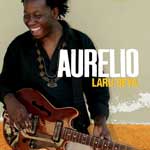The Garifuna community of Central America traces its roots to shipwrecked African slaves, and otherwise disappeared Arawak and Carib natives. Garifuna has long been marginalized in their homelands, Honduras, Belize, Guatemala and Nicaragua. Yet they now enjoy outsized international attention thanks to a few super talented singer/songwriters. Belize’s Andy Palacio was on his way to becoming a global star when he died suddenly at 49 in January, 2008. His Honduran friend and frequent collaborator Aurelio (Martinez) now carries the banner, and with his second international release, Laru Beya (On the Beach), Aurelio raises the standard for Garifuna pop to a new plateau.
This album took nearly three years to finish. Much of the original recording happened in an impromptu, beach side studio in Honduras, barely a month after Palacio’s death. These core sessions—featuring various guitarists, percussionists, and singers, not least a chorus of Garifuna women—are imbued with heartfelt reverence for Palacio, and a zealous determination to produce music worthy of his memory. After many nights lying in his hammock with his guitar trying vainly to compose a song for his late friend, Aurelio turned to tradition. “Wamada,” a song from the Garifuna’s generally shrouded Dügü religion, was retrofitted with new lyrics, and recorded by Aurelio in one astounding take. The new lyrics picture Palacio in heaven, also lying in his hammock, relaxing at last while others carry on his mission.
With most of the songs tracked, an unexpected twist transformed the music on Laru Beya. Aurelio was selected by Rolex—the watch people—as a candidate to spend a year mentoring with Senegal’s greatest singer, Youssou N’Dour. There were three candidates, but N’Dour picked Aurelio, perhaps because he could sense the passion with which this proud Garifuna man desired meaningful contact with Africa. Or perhaps he simply recognized Aurelio’s tremendous talent as a singer and songwriter. In any case, Aurelio spent the next year traveling Senegal, and the world, with N’Dour. And evidence of their experiences now interweave the 12 songs on Laru Beya.
N’Dour trades verses with Aurelio on “Lubara Wanwa,” a song about a sailor who reaches port to greet the birth of a child he suspects might not be his. The groove is slow—“like reggae, but not reggae,” says Aurelio. Aurelio has a gorgeous vocal high range, which he channels here into a taut, emotive timbre reminiscent of classic Senegalese pop. N’Dour, an architect of Senegalese mbalax, sounds serene by comparison—like a mentor—and inserts a few lines in English. On the spiritually weighted “Wamada,” the two singers interweave their voices over a spare, nylon-string guitar backing from Aurelio.
Elsewhere, we hear the boisterous voices of Rudy Gomis and Balla Sidibé from Orchestra Baobab, especially satisfying on the love song “Bisien Nu.” We also hear from some of N’Dour’s musicians, adding xalam (a Senegalese lute), kora, sabar and tama drums. A signature muted guitar riff from Jimmy Mbaye opens the celebratory “Ereba (Cassava),” a joyous Garifuna cooking lesson set to a punta beat. The rhythms on Laru Beya remain Garifuna: driving punta, folksy paranda, sacred hüngü-hüngü, and others. The addition of Senegalese percussion, complimenting the Latin percussion already present in Garifuna pop, sweetens these grooves without distorting them.
Aside from Aurelio’s consistently affecting vocal performance, that balance of openness and integrity is the key to Laru Beya’s success. From the lacy, percussive sonic web of “Yange” (written for Aurelio’s late brother) to the rolling, rap-laden trance of “Weimbayuwa” (which compares politicians to sharks), these tracks make a strong case for Garifuna music as porous and permeable, but so strong at the center that its identity is unthreatened by the inclusion of foreign sounds.
Aurelio spent the years from 2006-2010 in the Honduran parliament, risking his reputation and more to try and advance the cause of his people. It was a worthy effort, but one he has consigned to the past. Laru Beya makes it clear that Aurelio is a far better advocate for the Garifuna while in the recording studio and on the stages of the world.
Finally, kudos to producer/arranger/guitarist Ivan Duran, a major force behind this and other breakthrough Garifuna releases. Duran’s vision and leadership have been a boon to Andy Palacio, Aurelio Martinez, Paul Nabor, Umalali, and hopefully, they will continue to uplift the careers of more Garifuna acts to come.
-Banning Eyre









